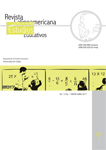Authors
Abstract
The present study analyzes the relationship between cognitive styles from the reflective-impulsive dimension and the quality of the teacher-child interaction in a group of 40 first grade children in a primary school at Ibagué, Tolima, Colombia. The MFF20 test was applied to identify the cognitive style and the system of observation CLASS was used to evaluate the quality of the teacher-child interaction. The findings were analyzed with descriptive statistics and the Spearman correlation was used to determine the relationship between the variables. The findings showed that most of the children (85%) still do not have a clear tendency to reflexivity or impulsivity. Regarding the quality of teacher-child relationship, the study found a medium emotional support and a low-medium instructional support, which were not associated with any cognitive style.
References
Bierman, K. et al. (2014). Effects of Head Start REDI on Children’s Outcomes 1 Year Later in Different Kindergarten Contexts. Child Development, 85(1), 140-159.
Buela-Casal, G., Carretero-Dios, H. y de los Santos-Roig, M. (2002). MFF-20. Test de emparejamiento de figuras conocidas. Madrid, España: TEA.
Buela-Casal, G. et al. (2000). Reflexividad-impulsividad en niños españoles y estadounidenses: un estudio transcultural. Clínica y Salud, 11(1), 15-33.
Buendía, E.L. y Ruiz, J.C. (sin fecha). Reflexividad-impulsividad y lectura. Enseñanza & Teaching. Revista Interuniversitaria de Didáctica, 6, 105-115.
Burchinal, M. et al. (2008). Predicting Child Outcomes at the End of Kindergarten from the Quality of Pre-Kindergarten Teacher–Child Interactions and Instruction. Applied Developmental Science, 12(3), 140-153.
Bronfenbrenner, U. (1979). La ecología del desarrollo humano. Barcelona, España: Paidós.
Cairns, E. y Cammock, J. (2013). MFF20. Test de emparejamiento de figuras conocidas. Madrid, España: TEA.
Curby, W., Rimm-Kaufman, E. and Ponitz, C. (2009). Teacher-Child Interactions and Children’s Achievement Trajectories across Kindergarten and First Grade. Journal of Educational Psychology, 101(4), 912-925.
Espinosa, J. y Colom, R. (1989). Introducción a la psicología diferencial cognoscitiva. Estudios de Psicología, 39, 39-54.
Fernández, F. e Hinojo, F.J. (2006). El estilo cognitivo reflexividad-impulsividad (R I) en el segundo ciclo de Educación Primaria: diferencias entre los sistemas de clasificación e implicaciones educativas. Enseñanza, 24, 117-130.
Hamre, B. and Pianta, R. (2005). Can Instructional and Emotional Support in the First-Grade Classroom Make a Difference for Children at Risk of School Failure? Child Development, 76(5), 949-967.
Hamre, B. et al. (2006). Student-Teacher Relationships. En Bear, G. and Kathleen, M. (Ed.). Children’s Needs III: Development, prevention and intervention (pp. 49-60). Maryland, USA: National Association of School Psychologists.
Hederich, C., Gravini, M. y Camargo, A. (2011). El estilo y la enseñanza: un debate sobre cómo enfrentar las diferencias individuales en el aula de clase. En Roig, R. y Laneve, C. La práctica educativa en la sociedad de la información. Innovación a través de la investigación (pp. 213-222). Alicante, España: Editorial Marfil.
Hernández Sampieri, R., Fernández Collado, C. y Baptista Lucio, P. (2006). Metodología de la investigación. Ciudad de México, México: McGraw-Hill.
Jonassen, D. y Grabowski, B. (1993). Handbook of Individual Differences, Learning, and Instruction. New Jersey, USA: Hillsdale.
Kagan, J. (1965). Matching Familiar Figures Test. Cambridge, USA: Harvard University.
Kagan, J. (1965). Reflection-impulsivity and reading ability in primary grade children. Child Development, 36, 609-628.
Kagan, J. (1966). Reflection-Impulsivity: The Generality and Dynamic of Conceptual Tempo. Journal of Abnormal Psychology, 71, 17-24.
Kozhevnikov, M. (2007). Cognitive Styles in the Context of Modern Psychology: Toward an Integrated Framework of Cognitive Style. Psychological Bulletin, 133, 464-481.
Maldonado-Carreño, C. and Votruba-Drzal, E. (2013). Children’s Early Educational Experiences in Private Settings. Evidence from Bogotá, Colombia. Presentación en ProLEER Annual Meeting. Center for the Developing Child, Harvard University, Cambridge, USA.
Montero, J., Navarro, J. y Ramiro, P. (2005). Estilos cognitivos dependencia-independencia de campo, reflexividad-impulsividad y superdotación intelectual. FAÍSCA. Revista de Altas Capacidades, 12, 5-15.
Núñez del Río, M.C. y Fontana, A.M. (2009). Competencia socioemocional en el aula: características del profesor que favorecen la motivación por el aprendizaje en alumnos de enseñanza secundaria obligatoria. REOP. Revista Española de Orientación y Psicopedagogía, 20(3), 257-269.
La Paro, M., Pianta, R. and Stuhlman, M. (2004). The Classroom Assessment Scoring System: Findings from the Prekindergarten. The Elementary School Journal, 104(5), 409-426.
O’Connor, E. (2010). Teacher-child relationships as dynamic systems. Journal of School Psychology, 48, 187-218.
Palacios, J., Marchesi, A. y Coll, C. (2004). Desarrollo psicológico y educación, psicología evolutiva. Madrid, España: Alianza Psicología.
Pianta, R. and Walsh, D. (1996). High-Risk Children in Schools. New York, USA: Routledge.
Pianta, R.C., La Paro, K.M. and Hamre, B.K. (2008). Classroom Assessment Scoring System [CLASS]: Manual, Pre-K. Baltimore, USA: Brookes Publishing.
Pianta, R. et al. (2008). Classroom Effects on Children’s Achievement Trajectories in Elementary School. American Educational Research Journal, 45(2), 364-397.
Ramiro, P. et al. (2010). Estilo cognitivo reflexividad impulsividad en escolares con alto nivel intelectual. Revista Latinoamericana de Psicología, 42(2), 193-202.
Seçer, Z. et al. (2010). Social Skills and Problem Behaviours of Children with Different Cognitive Styles who Attend Preschool Education. Australian British Journal of Guidance & Counselling, 20(1), 91-98.
Treviño, E. (2013). Calidad de la educación parvularia: las prácticas de clase y el camino a la mejora. Pensamiento Educativo, 50(1), 40-62.
UNESCO. (1994). Proyecto principal de educación en América Latina y del Caribe. Santiago de Chile, Chile: OREALC, UNESCO.
UNESCO, LLECE. (2008). Eficacia escolar y factores asociados en América Latina y del Caribe. Santiago de Chile, Chile: OREALC, UNESCO.
Witkin, H.A. y Goodenough, D.R. (1981). Estilos cognitivos. Naturaleza y orígenes. Madrid, España: Pirámide.

 PDF (Español)
PDF (Español)
 FLIP
FLIP
























